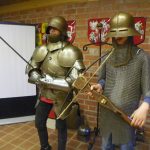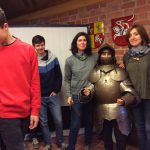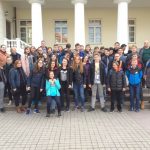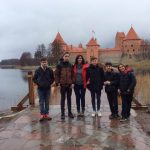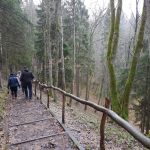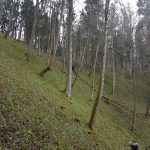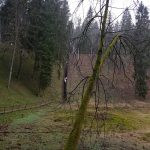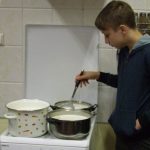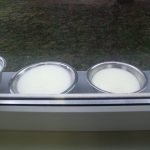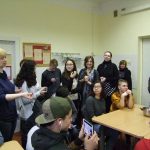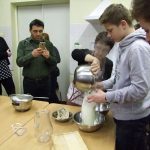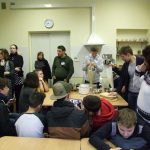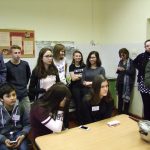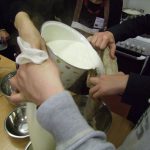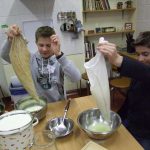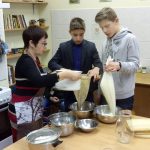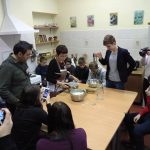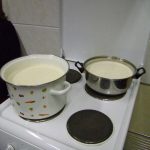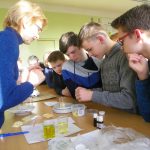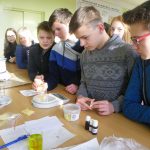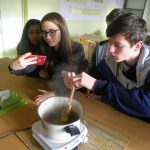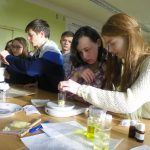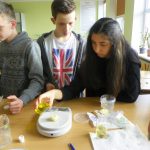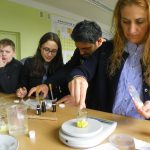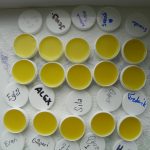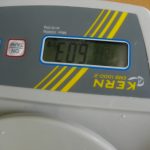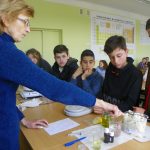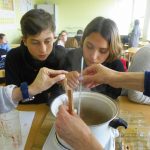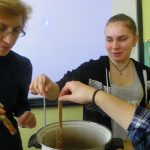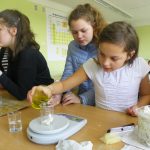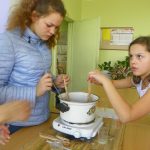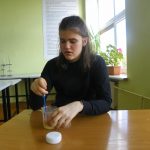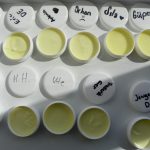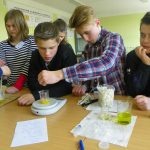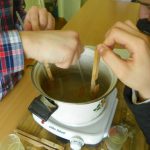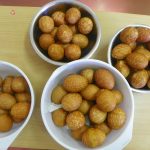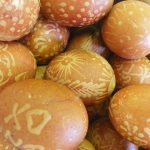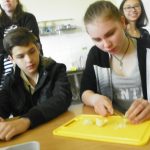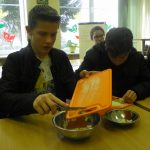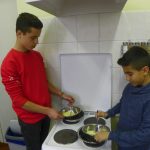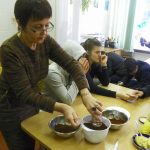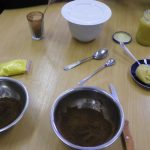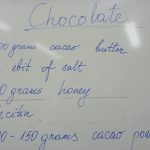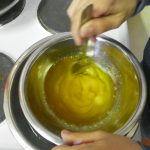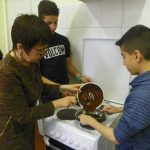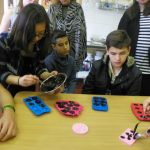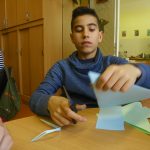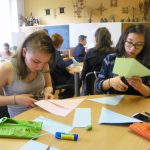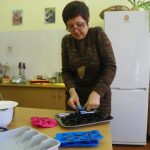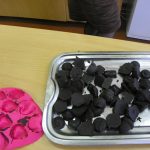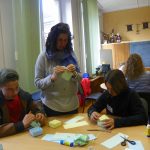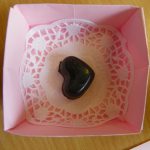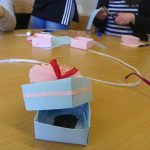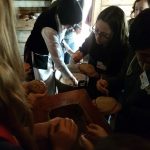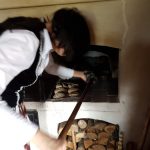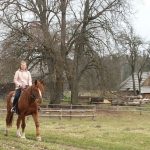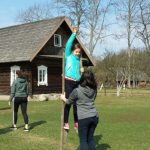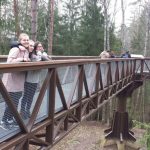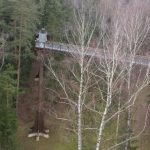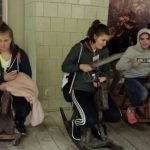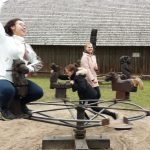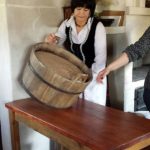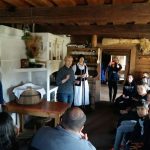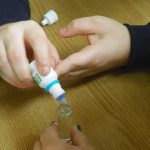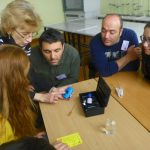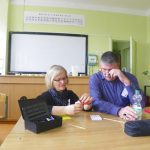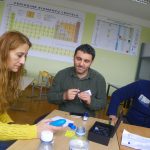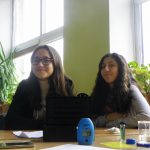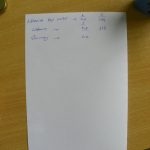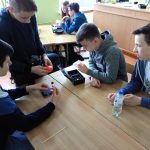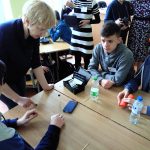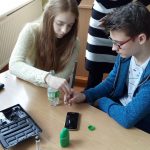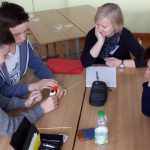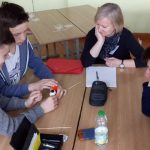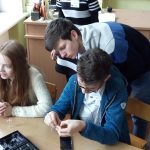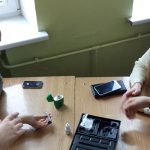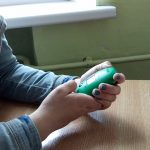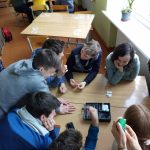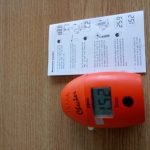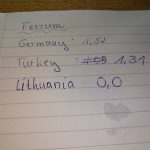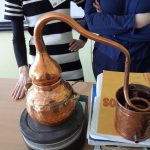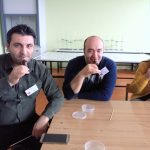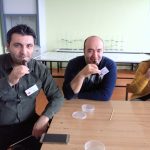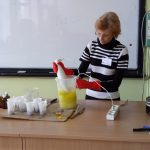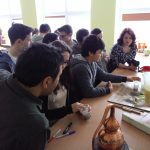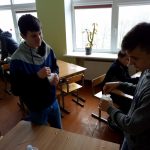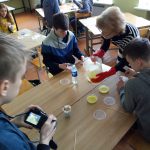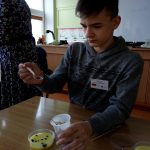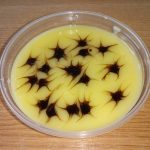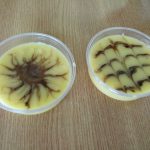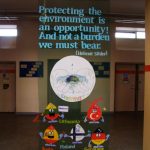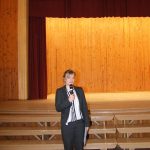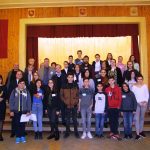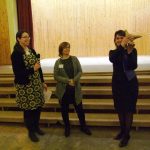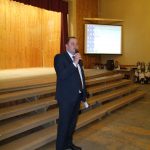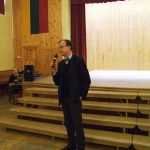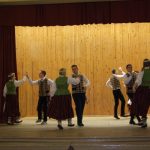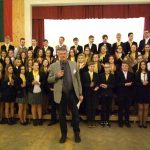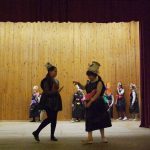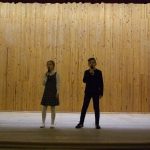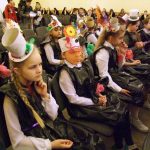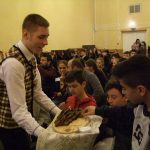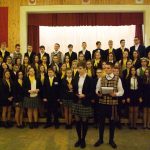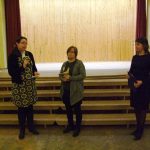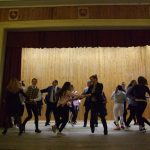Trakai castle is situated on a small island. Such a location was chosen for defensive purposes. Ancient times not only castles but people settlements were near water as water was a source of life. Lithuanian capital Vilnius is also located on the water, on the Neris. Kaunas is situated on the confluence of the two biggest rivers the Nemunas and the Neris.
Category: 4th MOBILITY TO LITHUANIA
Making Whey
Together with teacher Nijole Vosyliene students make way from ecological farm milk. Whey was used in making ecological soap.
Making Eco Friendly Lip Balm
Eco Cosmetics
Friday was devoted for body beauty. Teenages , especially girls use quite a lot of cosmetics nowadays. But cosmetics bought at various stores aren’t very healthy as it contains a lot of preservatives and ingredients that are harmful for humans and environment. To avoid this Chemistry teacher Asta Jakutiene taught the students how to make ecological face cream and lip balm by themselves. Everybody was happy with the results of their hard work.
Easter Eggs
Painting Easter eggs in an environmental friendly way, using bees wax and onion shells.
Painted Easter Eggs are considered to be one of the most fragile kind of Lithuanian folk art. In written sources painted eggs were in 1549. Like all over the world, in Lithuania painted eggs symbolize life, fertility, awakening of nature. Until 20th century the eggs were painted using natural means, such like onion shells, birch leaves, oak leaves, black alder leaves various plants and flowers.
VARIATY OF COLOURS
Chocolate – 4 spoons of ground coffee, 1 tea spoon of vinegar, water.
Brown– 12 bags of black tea, 1 tea spoon of vinegar, water.
Orange– 4 cups of red onion shells, 1 tea spoon of vinegar, water.
Yellow– 1 cup of chamomile, 1 tea spoon of vinegar, water.
Green– 2 cups of spinach, 1 tea spoon of vinegar, water.
Rose – red beet juice, 1 tea spoon of vinegar.
Levande– violet flowers, 1 tea spoon of vinegar, water.
Golden– 2-3 tea spoons of curry or yellow ginger1 tea spoon of vinegar, water.
Blue– 2 red cabbages (chopped), 2 liters of water,
6 spoons of vinegar.
Ecological Chocolate
Everybody-children and adults like chocolates. So we decided to find out how to make healthy ecological chocolate by ourselves. Moreover, we packed it into handmade boxes. It appeared to be the most delicious workshop.
Sustainable Consumption from the Past to the Future
On Wednesday early in the morning we left for „Horse museum“ museum near Anyksciai. There we had a workshop about baking bread in the way our ancestors used to do it. As we know, in the past people lived in harmony with nature and used to save all natural resources, including water. Holding hot loaves of bread in our hands we headed to the Treetop walking path near the Sventoji.
Water Tests
April the 04th. Testing and comparing tap water from different countries
Making Ecological Soap
On Tuesday all the students and their teachers gathered at school. Together with the Chemistry teacher Asta Jakutiene they learned how to make ecological soap from the ecological, environmental friendly ingredients. Everybody made a piece of such a soap for him/herself which they brought back home. The most important that the soap they made was not only environment friendly but also healthy.
Transnational Teaching Learning Activities in Lithuania
April 03rd-07th the 4th TTLA of Erasmus+ KA2 project “Protecting the environment is an opportunity! And not a burden we must bear.”(Helmut Sihler) took place at Kaunas Versvu Gymnasium. 18 students and 10 teachers from Veikkola School, Veikkola, Finlan, SI La Miquela, Bescano, Spain, Pestalozzischule Radeberg Oberschule, Radeberg, Germany, Mimar Sinan Ortaokulu, Kumluca, Turkey were visiting Kaunas Versvu Gymnasium. At the opening ceremony project participants were welcomed by Finnish Ambasador in Lithuania HE Mr. Christer Michelsson, Mrs.Annabelle Winterhagen, a representative of the German Embassy Cultural and Press Department, Mrs. Kristina Dėdelienė , a Chief Specialist of Kaunas municipality the Environment Department.
International collaboration opens up development opportunities to students and teachers alike. We can develop culturally and improve our communication capacity in general, and foreign language capacity in particular.
Erasmus+ projects at European and global dimensions have practical benefits of introducing students to higher education and employment opportunities beyond their national contexts. These projects also hold personal benefits of making us more tolerant of each other and bring us closer to one another despite the differences in our origins. The closer we work and collaborate, the more we learn about and from one another, the less irrational conflict we will have in this world.
If we want to achieve sustainable change, we have to secure personal commitment.
Thanks to this Erasmus + project, students grow aware of global environmental issues we are facing, they engage these issues by analyzing their origins, evaluating their impact on our lives and surroundings, most importantly, they learn how to live organically and protect their environment.
By working together with partners form a variety of countries, our students not only learn new subjects but also experience many joyful moments, adventures and find new friends. We hope that during this week in Lithuania, we will together learn a lot but also have fun whilst our friendship and collaboration will extend way beyond this project. By collaborating with one another we build the future of Europe together and for everyone, not apart and just for an exclusive group or one nation.

